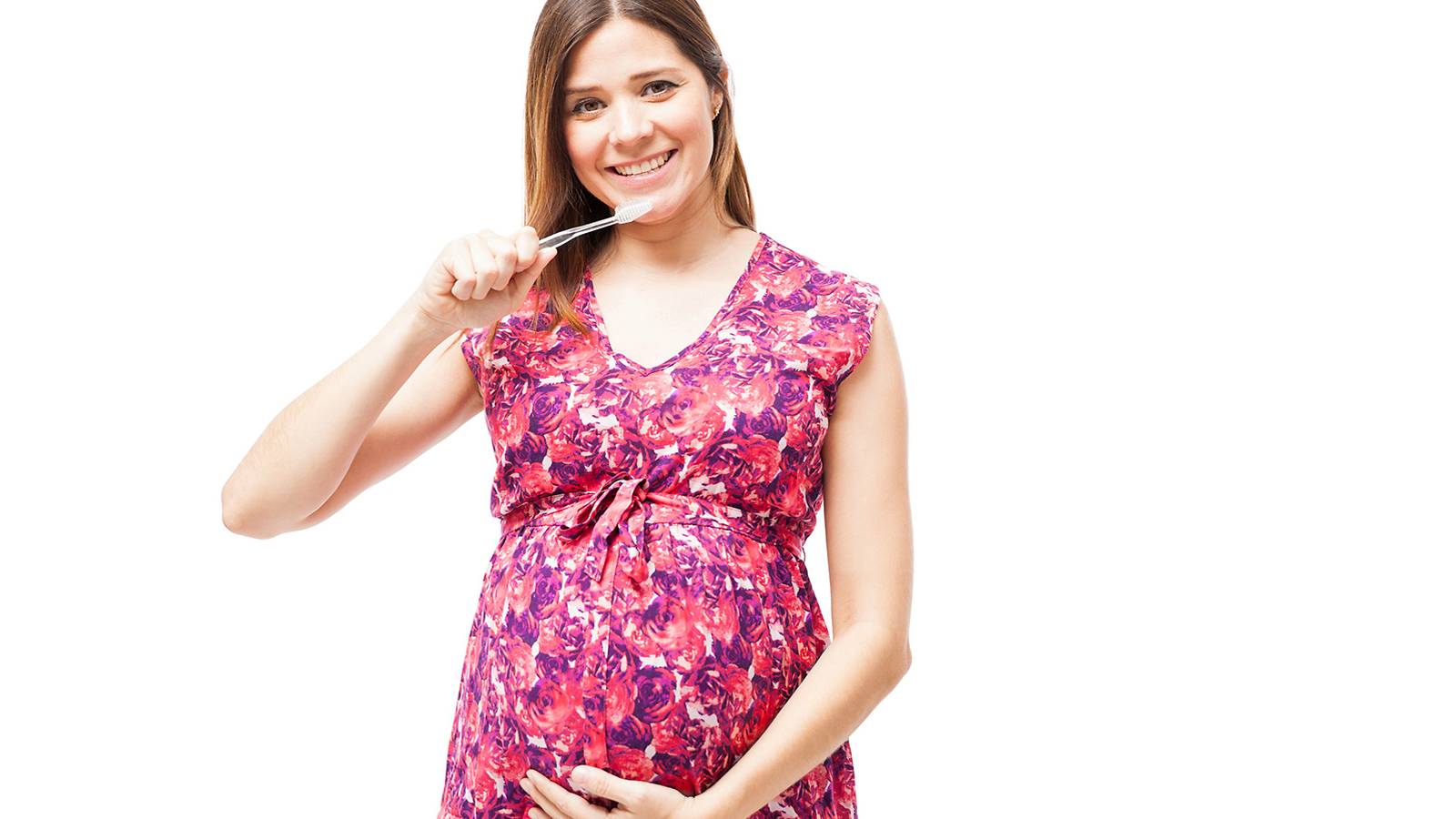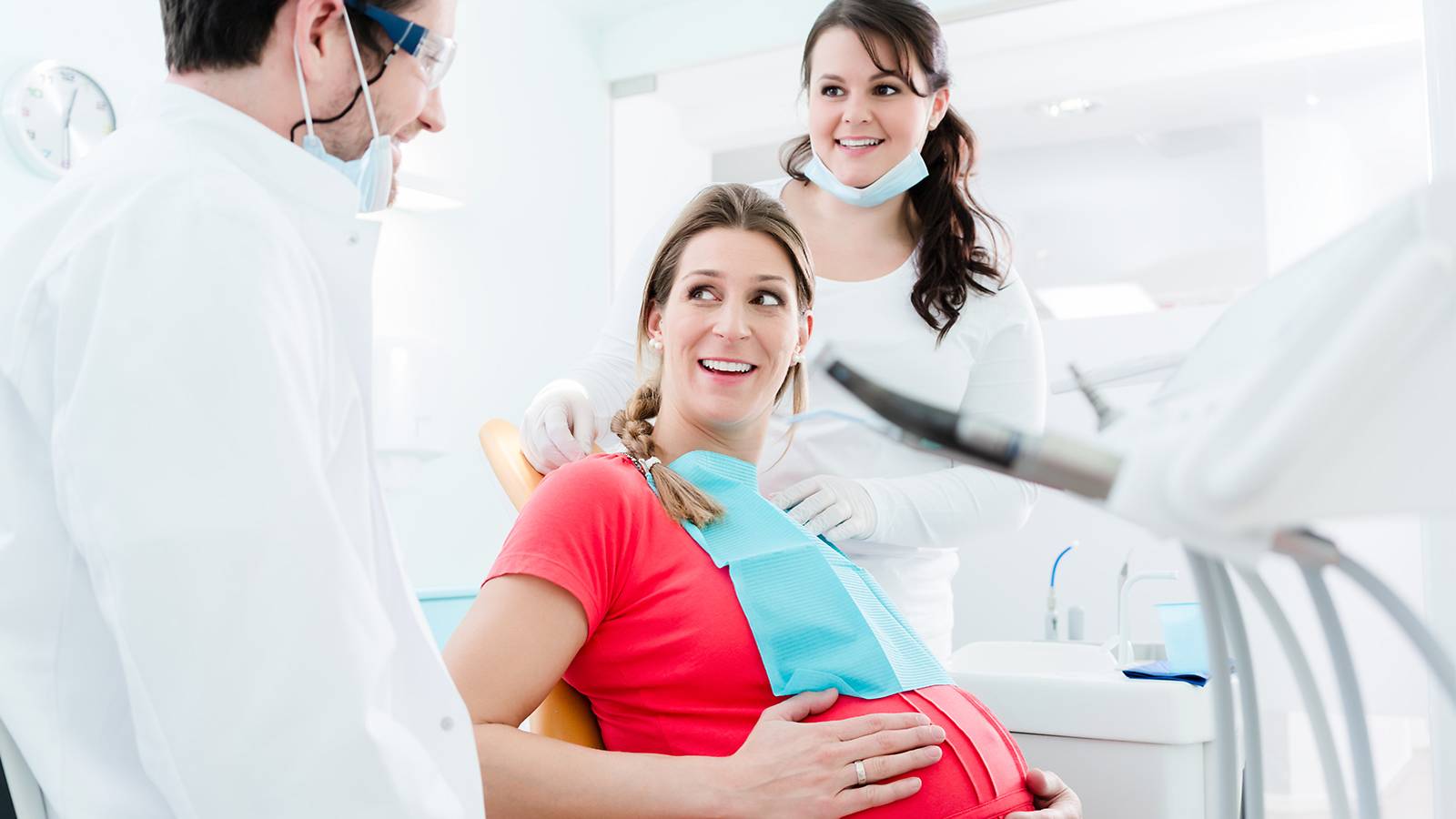How do I brush when I’m feeling nauseous? Can I visit the dentist? Get answers to your bump-related dental posers.

Your body goes through plenty of changes during those nine long months of pregnancy. Some physical, others hormonal. “This includes an increase in oestrogen and progesterone and reduced immunity towards gum infections,” notes Dr Fu Jia Hui, a senior registrar specialising in Periodontics at the NUH University Dental Cluster.
While hormonal changes are good for your growing baby, it can create havoc on your immunity and health, especially when you have existing gum problems.
Dr Fu explains that during pregnancy, you’ll experience the following changes:
* A decrease in maternal immunity against gum bacteria.
* Gums may have a hyperactive response to plaque.
* An increased formation of inflammatory proteins.
* An increase in the types of bacteria which causes severe gum disease.
“As a result, the gums become redder, more tender, swollen and more prone to bleeding,” adds Dr Fu. “These signs and symptoms gradually increase from the first to the third trimester but slowly improve after delivery.”
“Bacteria from the gums may travel into the blood stream to the placenta to cause a systemic inflammatory response.”
Don’t compromise on your dental health when you’re growing that baby though. Several studies have shown a direct association between dental problems and pregnancy complications.
For example, periodontitis (chronic inflammation of the gums and bone) is associated with pre-eclampsia (high blood pressure during pregnancy), preterm labour and low birthweight babies. “Bacteria from the gums may travel into the blood stream to the placenta and cause a systemic inflammatory response,” explains Dr Fu. “This may induce uterine muscles to contract, leading to premature labour and babies of low birthweight.”
Dr Fu notes that pre-eclampsia is another condition that can flare up as a result of gum bacteria. “Inflammation caused by bacteria from the gums can result in the narrowing of blood vessels in the placenta and further release inflammatory proteins, which elevate the blood pressure of pregnant mothers.”
Wondering how to keep your teeth, gums and baby in the pink of health during pregnancy? Read on for our top tips.
FAQ #1: How do I maintain good dental hygiene when I have morning sickness?
Good dental hygiene is primarily maintained by a good toothbrushing technique which you should carry out for at least two minutes twice a day. Couple this with flossing and using mouthwash.
However, when you’re battling morning sickness, the mere thought of putting a brush into your mouth can result in a gag reflux. How do you maintain healthy teeth and gums?
Dr Fu has these suggestions:
Tip #1: Brush when you’re feeling well. For example, between meals when you’re not feeling nauseated.
Tip #2: Use a toothbrush with a small head like the ones kids use. A smaller toothbrush can better reach those hard-to-clean areas while minimising the gag reflex.
Tip #3: Since morning sickness is generally triggered by smell or taste, use just a smear of toothpaste. Or change to a milder or bland-tasting toothpaste, such as the less minty kind or children’s fruity toothpaste. You can also opt to not use toothpaste at all. “Bacterial plaque can be removed with good thorough toothbrushing, which has to be performed together with meticulous cleaning between teeth using floss or an interdental brush,” Dr Fu adds.
Tip #4: Rinse before brushing to clear any taste in the mouth. Spit and rinse as often as needed when brushing. Alternatively, face downwards, so that saliva flows out and there is minimal accumulation in the mouth, which can cause gagging.
Tip #5: Use an alcohol-free fluoride mouth rinse to reduce the speed of the plaque buildup and prevent tooth decay. “If the commercial mouth rinses do not work for you, try rinsing your mouth out with water. If you suffer from frequent bouts of vomiting, make your own mouth wash by mixing a teaspoon of baking soda with some water,” adds Dr Fu.
Tip #6: Avoid sticky and starchy food with a high sugar content. These foods increase your chances of tooth decay.
Tip #7: If all fails, bypass the brushing and stick to flossing to remove plaque between teeth. Then use an alcohol-free fluoride mouth rinse to reduce the speed of plaque buildup and prevent tooth decay.

FAQ #2: When can I visit the dentist?
If you’re getting any dental treatment done, get it in the second trimester, when the baby’s development is more stable.
“In the first trimester, baby’s organs are developing, so there may be a higher risk of miscarriage,” notes Dr Fu. “In the third trimester, it may be uncomfortable for the pregnant mum to lie on the dental chair.”
It is generally safe to do scaling and polishing during pregnancy. However, it’s better to defer any elective dental treatment till post-delivery although the risk is low, Dr Fu says.
If you must visit your dentist during your last trimester, make sure your doctor positions you in a semi-reclining position. “This is because, when lying down, the uterus compresses on major blood vessels, which can cause a reduction in blood pressure and the pregnant mother may experience increased heart rate and light-headedness,” she explains.
Since pregnancy can increase the risk of tooth decay and gum disease, visit the dentist as soon as you feel physically well, post-partum, for a tooth and gum health check.
FAQ #3: Any dental treatments I should stay away from during pregnancy?
Most dental treatment can be performed with local anaesthesia and therefore pose minimal risks to you and bubba. “However, surgical procedures that are more invasive and extensive may stress the mother and indirectly affect the baby,” Dr Fu notes.
It is generally safe to have dental radiographs (or X-rays) taken during pregnancy as they have a very low dose of radiation. Dr Fu points out that a neck-and-body apron made of lead will also be placed over you before the X-ray, further reducing your exposure to radiation.
FAQ #4: What dental-related medications can I take?
“Local anaesthetics and [antibiotics like] penicillin are generally safe for use by pregnant mums,” notes Dr Fu. “If you’re allergic to penicillin, you can consider Clindamycin.”
Other antibiotics such as tetracycline, fluoroquinolones and metronidazole are a big no-no because they can adversely affect your foetus. Dr Fu warns, “Tetracycline inhibit bone growth and cause enamel defects and tooth discolouration in the baby’s teeth. Fluoroquinolones damages the baby’s bones and cartilage while metronidazole causes genetic mutations.”
As for painkillers, Dr Fu recommends that you stick to paracetamol (Acetaminophen) because it hasn’t posed any risk to the developing baby. Other types of painkillers, such as aspirin or non-steroidal anti-inflammatory drugs such as ibuprofen, ketoprofen, and naproxen, are not suitable for pregnant mums as studies have shown potential risk to human foetuses.
FAQ #5: What can I eat or drink when I am pregnant to maintain good dental hygiene?
Avoid foods with high sugar content and take a well-balanced diet rich in vitamin C, vitamin D, calcium, omega-3, DHA, and antioxidants. This will help to prevent tooth decay and gum disease. Another top tip from Dr Fu: “Munch on hard foods such as celery and apples. They help to reduce plaque buildup.”
Dr Fu Jia Hui specialises in Periodontics at the NUH University Dental Cluster. It will be a part of the new National University Centre for Oral Health, Singapore (NUCOHS), which is slated to open in 2019.
Photos: iStock
Like us on Facebook and check SmartParents regularly for the latest reads!
In case you missed these features…
Pregnancy lingo for clueless dads-to-be
